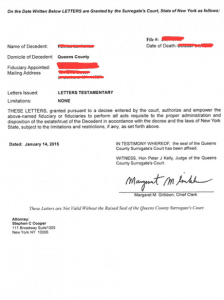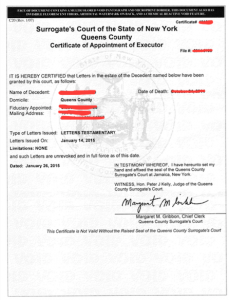Can an Executor Sell a House Before Probate
Can an executor sell a house before probate? No. You cannot act as the executor until the court issues Letters Testamentary. Only then can you collect the assets of the estate, pay the estate’s debts and expenses and distribute the remainder to the estate’s beneficiaries.
If an executor will try to sell a house to a third party before probate, the sale is unlikely to succeed. Buyers are careful to check that the executor selling the house has the authority to sell it to them. The buyer’s attorney will ask for a Letters Testamentary or a Certificate of Appointment of Executor, like illustrated below. The title company will ask for one as well. If the “executor” will not be able to provide the certification, the sale will not go through. If the “executor” will forge the documentation, then he’s not a real executor at all and he can be criminally prosecuted for forgery and he will lose the chance of being appointed as executor.


If an executor will try to sell a house to himself before probate, and it’s below market value, then the sale can be set aside and the “executor” will lose the chance of becoming a real executor. Even if the executor is not appointed by the court yet, he is still named in the will as the executor, so he is responsible to protect the well-being of the beneficiaries.
An executor is a manager of estate property. The legal term for someone managing money, including an executor is “fiduciary.” [1] New York’s Estates, Powers and Trusts Law governs the conduct of an estate fiduciary, as well as a trustee and an agent under a Power of Attorney.
New York Consolidated Laws, Estates, Powers and Trusts Law – EPT § 11-1.6 states that “Every fiduciary shall keep property received as fiduciary separate from his individual property. He shall not invest or deposit such property with any corporation or other person doing business under the banking law, or with any other person or institution, in his own name, but all transactions by him affecting such property shall be in his name as fiduciary.” [2]
New York’s Penal Law (the Criminal Law) states that “A person steals property and commits larceny when, with intent to deprive another of property or to appropriate the same to himself or to a third person, he wrongfully takes, obtains or withholds such property from an owner thereof.” [3]
The estate is the owner of the house. If an executor transfers the house to himself, even if he’s paying something for it, he commits larceny.
New York Penal Law continues to say that “Larceny includes a wrongful taking, obtaining or withholding of another’s property, with the intent prescribed in subdivision one of this section, committed … by conduct heretofore defined or known as common law larceny by trespassory taking, common-law larceny by trick, embezzlement, or obtaining property by false pretenses.” [4]
If you are concerned with an issue of can an executor sell the house before probate, then it is likely that you need to speak to an estate lawyer. Albert Goodwin, Esq. is an estate lawyer with over a decade of experience. He can be reached at (212) 233-1233.
